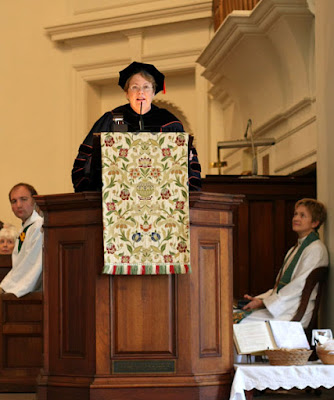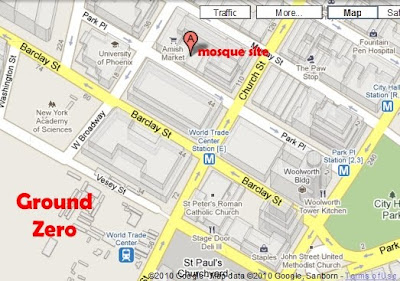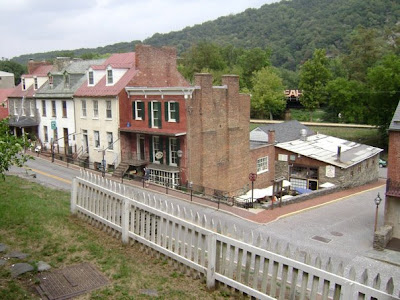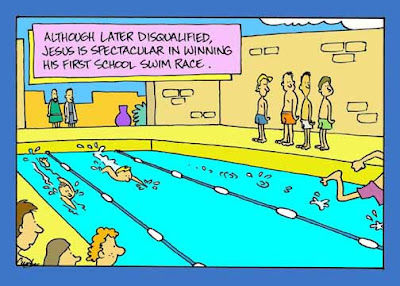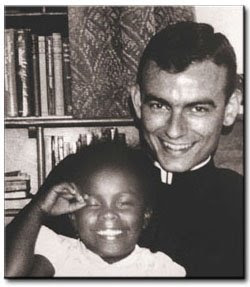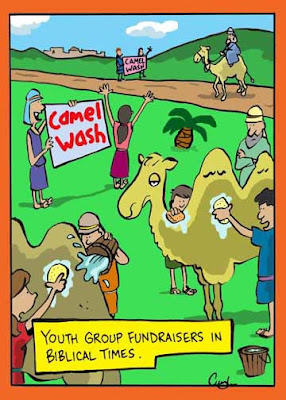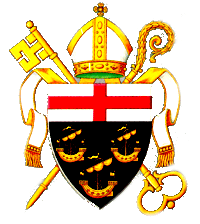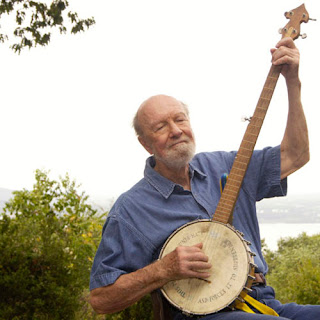
Today is the feast day of one of my personal favorites on the Anglican calendar of saints:
Jeremy Taylor (1613-1667), one of the
“Caroline Divines.
” Taylor is chiefly known for his masterful work,
The Rules and Exercise of Holy Living (1650) which has never gone out of print.
I've mentioned him in this space on other occasions, and I continue to return to his works and wisdom on everything from church politics to prayer. Above all he strived to be practical; theological theory was meaningless to Taylor if he could not touch it, test it, live with it in the real world. Here is a gem from Holy Living:
“Let everything you see represent to your spirit the presence, the excellency, and the power of God; and let your conversation with the creatures lead you unto the Creator; for so shall your actions be done more frequently, with an actual eye to God’s presence, by your often seeing him in the glass of the creation.
In the face of the sun you may see God’s beauty; in the fire you may feel his heat warming; in the water, his gentleness to refresh you: he it is that comforts your spirit when you have taken cordials; it is the dew of heaven that makes your field give you bread; and the breasts of God are the bottles that minister drink to your necessities.”
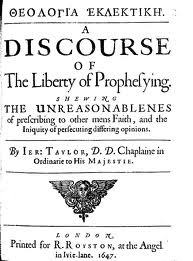
Taylor should be known for much more, including his Liberty of Prophesying (1647) a book calling for an end to government-backed coercion in support of religion, an idea that would not take root for another century in the Enlightenment.
In his day, Taylor was known as a great preacher and a masterful crafter of prose, including this from a sermon given in 1653:
“Prayer is the peace of our spirit, the stillness of our thoughts, the evenness of recollection, the seat of meditation, the rest of our cares and the calm of our tempest; prayer is the issue of a quiet mind, of untroubled thoughts, it is the daughter of charity, and the sister of meekness.”
Taylor profoundly influenced his own generation and those who came after him, including Thomas Jefferson who said every educated person should have Taylor on the bookshelf. Many of Taylor's quotes can be found in 19th century "books of days," the forerunner to the contemporary "Forward Day by Day." Taylor's story is worth telling.
Taylor was born and educated in Cambridge, the fourth of six children; eventually coming to the attention of Archbishop William Laud who heard him preach at St. Paul’s Cathedral in London. Taylor became the protégé of Laud, who secured for him a teaching post at All Souls College, Oxford, in 1635. Taylor was also appointed chaplain to King Charles I. Taylor was on the ecclesiastical fast-track, and seemed destined to become a bishop, perhaps even Archbishop of Canterbury.
Life intervened.
In 1640, Charles I overplayed his hand with the Puritans in Parliament, and civil war erupted between the armies of Parliament and the Royalists. England was ravaged. In 1642, the king was captured along with his chaplain, Taylor. Charles I was beheaded and as he went to the gallows, he gave his ring to Taylor, who was allowed to go into exile in Wales in 1645.
In Wales, Taylor wrote prolifically, taking an attitude that both sides were profoundly wrong and sinful. He took Anglican theological theory and applied it to real life as he experienced it. In his most popular book, Holy Living, Taylor explained a way of practicing a “holy life” in ordinary walks of life. He lived at a time when prayer books were banned, churches burned, and people felt adrift and worse. How could they worship God – be present with God – if not in a church? Taylor explained how, and it made him one of the most popular and oft-printed religious authors well into the early 20th century.
For Taylor, God was everywhere. Contemporary authors have re-discovered that theme, but few have crafted language as soaring as Taylor's:
“So that we imagine God to be as the air and the sea; and we all enclosed in his circle, wrapped up in the lap of his infinite nature, or as infants in the wombs of their pregnant mothers: and we can no more be removed from the presence of God than from our being.”
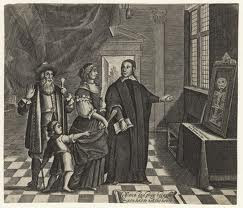
When Taylor's wife died, he wrote a companion volume to Holy Living, called Holy Dying. It was truly an ode to his wife, and his own way of struggling through his grief. Edmund Gosse, who wrote a biography of Taylor in 1903 that is still quite readable, considers Holy Dying Taylor's most overlooked masterpiece (the engraving at right is an inset on the cover page to Holy Dying; note the skeleton in the mirror). It is a sad book, and a hard read, but within in the book is hope for new life to come.
Eventually, the monarchy was restored. Taylor was made a bishop, but in Northern Ireland (perhaps because the Royalists did not fully trust him). Truthfully, he had a miserable time as a bishop, fought endlessly with the Irish priests, and longed for a return to England that never came.
In Ireland, he began writing yet another long set of works, including a treatise on how bishops have a role in the church only as long as they are promoting ministry. He also developed his own doctrine of "just war" that was stricter than the prevalent doctrine handed down from the Catholic era in Britain. Perhaps we would do well in our day to take a few pages from Taylor.
He outlived most of his children, and died in 1667. From Holy Dying: "When we descend to our graves, we may rest in the bosom of our Lord, till the mansions be prepared where we are shall sing and feast eternally."
May you have a blessed feast day of Jeremy Taylor.
 Our friend Karen from Tennessee tells us that she keeps a quote in her kitchen from songwriter Guy Clark: “There’s only two things that money can’t buy— that’s true love and home-grown tomatoes.”
Our friend Karen from Tennessee tells us that she keeps a quote in her kitchen from songwriter Guy Clark: “There’s only two things that money can’t buy— that’s true love and home-grown tomatoes.” 